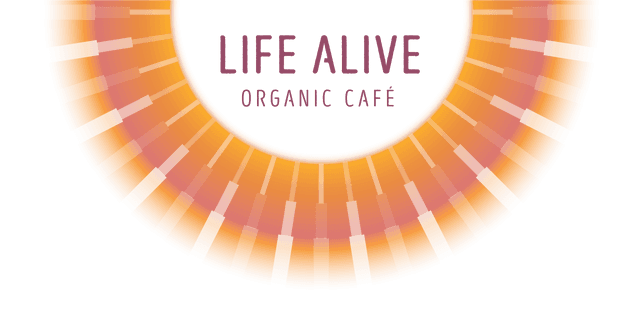Life Alive’s higher purpose is to energize the vitality of all living beings and the planet. This means that we nourish and support each other and our community in a way that respects not only the bodies we live in, but also the planet we share. This is why sourcing organic matters to us.
We define organic ingredients as those produced without synthetic pesticides, fertilizers, genetically modified organisms, antibiotics, or growth hormones. This applies to both USDA Certified Organic, as well as verified transitional farms and verified organic in practice, as we support farmers that are in the process of becoming organic certified and also recognize certain vendors may not have the resources to afford the government-approved certification.
By Eating and Supporting Organic Together We:
Directly support planetary wellness. The global food system is responsible for over 30% of all greenhouse gas emissions. Organic farming does not use synthetic pesticides or fertilizers (the primary contributors to these greenhouse gas emissions), lowering levels of pesticide residue & chemical exposure to the air, water and soil.
Enrich soil fertility and reduce erosion by encouraging crop rotation.
Improve water quality and conservation by supporting farms that use less water and do not create runoff from synthetic materials.
Encourage safe and healthy biodiversity.
Support the use of pesticides derived from natural sources without eliminating important pollinators, insects and bugs that drive a rich ecosystem of microorganisms, plants and animals.
Provide access to fresh, seasonal products without the use of preservatives.
Support the growth of crops that have higher levels of antioxidants, vitamins, iron, magnesium and phosphorus than those grown with synthetic pesticides and fertilizers.
Organic Sourcing at Life Alive
Sourcing the best, high quality, organic ingredients is an ongoing journey for Life Alive. Every day we work to strengthen our relationships with our suppliers and distributors, and find new sources of products and ingredients that will nourish our guests, our communities, and the planet.
We adhere closely to the recommendations of respected subject-matter experts, such as the Environmental Working Group (EWG). We don’t compromise on sourcing organic for the ingredients on the EWG’s Dirty Dozen, their trusted list of ingredients known to have the highest level of pesticide residue from conventional farming. The list includes top Life Alive ingredients like kale. We buy 35,000 pounds of organic kale annually and as Life Alive grows, so does our impact.

Our commitment goes far beyond the Dirty Dozen. For the health and vitality of all, we are committed to sourcing organic ingredients whenever possible. Today, 95% of our fruits, vegetables, whole grains, legumes, nuts and seeds in our pantry are organically sourced. This is a number we are incredibly proud of, but also a number we are seeking to improve with each sourcing decision and farmer relationship we forge.

The energy we need to thrive comes from the nutrients in our food, air and water. When we cultivate and consume organic ingredients, we are supporting ourselves, our communities and our planet with the highest quality and most natural nutrients possible. The more we choose organic, the stronger our bodies, our soil and our Earth will be!
Beyond Organic
At Life Alive, we also prioritize the following certifications and practices when it comes to sourcing to ensure the highest quality, safety and production of our ingredients:
Non GMO Project Verified: a product produced without genetic engineering and its ingredients are not derived from GMOs.
Fair Trade: ingredients produced in accordance with Fairtrade International’s rigorous environmental, economic and social standards.
Certified B Corp: a designation that certifies a business is meeting high standards of verified performance, accountability, and transparency on factors from employee benefits and charitable giving to supply chain practices and input materials.
Certified Humane: kinder animal living condition standards that improve the lives of farm animals and promote responsible practices.
Regenerative Farming: a conservation and rehabilitation approach to food and farming systems.
Mindful Land & Water Usage: being mindful of the water and land resources needed to produce and prepare certain ingredients.
Local & Regional Availability: supporting local and regional farms and businesses whenever possible.



